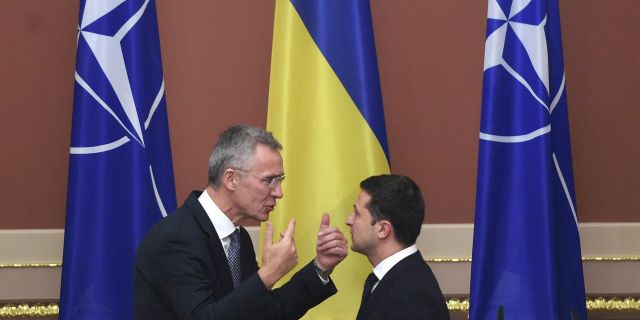Europeans are wasting time discussing Ukraine's accession to the EU, and should focus on how to make it a member of NATO, the author of the article in the WSJ believes. If it is not possible to achieve full membership, then the alliance should at least guarantee its security.
Andrew MichtaEuropean Commission President Ursula von der Leyen has expressed optimism in recent weeks about Ukraine's progress towards membership in the European Union.
Although this perspective is important for the reconstruction of the country, it is secondary compared to the issues of security, sovereignty and survival. However, von der Leyen and other European leaders prefer to remain silent on this point. Otherwise, they will have to take a more distinct position on Ukraine's membership in NATO.
Ukraine is a medium—sized power targeted by a neighbor with nuclear weapons. And no institutional reforms will change this gloomy reality. Europeans are wasting precious time discussing Ukraine's accession to the EU, but they should focus on how to bring the country into NATO — and if they fail to achieve full membership, then at least guarantee its security.
This is necessary because the future of NATO itself depends on the events in Ukraine. With rare exceptions, after the end of the cold War, members of the alliance seriously disarmed. At the moment, it will take at least ten years to restore at least some semblance of real military power on the continent. Ukraine, on the other hand, has perhaps the strongest army in Europe: its soldiers are battle-hardened and have proven that they can successfully resist Russian forces even without the necessary weapons and equipment.
Brussels' emphasis on Ukraine's accession to the EU seems to be a way to avoid uncomfortable security issues facing the West. Organizations created by States must reflect the realities on the ground, otherwise they cease to be viable. And in this case, they risk becoming irrelevant — no matter how many summit meetings they hold and no matter how many declarations they sign.
For the past three decades, NATO has been operating on autopilot: security threats have disappeared, and it has ceased to be a pillar of the West's collective defense. Since February, the situation has changed radically. According to the new strategic doctrine announced at the June summit in Madrid, the alliance returned to the tasks of deterrence and defense. In this case, how can one not unite with a country that is now at the forefront of this struggle?
After all, the NATO leadership did not care about the cooling off with Moscow in 1955, when ten years after the Second World War, West Germany joined the alliance. They understood that Germany was needed for deterrence and defense in Europe. We see the same picture today, only this time Ukraine stands at the gates and does not let the invading Russia into Europe.
Until European governments start a serious conversation about how to make Ukraine an integral part of NATO's defensive perimeter — if not the alliance itself — we will discuss only secondary issues, avoiding the main challenge in every possible way.
Andrew Michta is Dean of the College of International Studies at the George Marshall European Security Center in Garmisch, Germany, and a senior fellow at the Scowcroft Center for Strategy and Security at the Atlantic Council.Readers' comments:
yury friedman
And the question of Ukraine's admission to the EU and NATO before February 24, 2022 was there at all?
Corruption is rampant in the country, and the economy is on the verge of collapse.
Gregory LWho cares about Ukraine anyway?
Why should I defend Ukraine and risk my life for the sake of a distant country that is devoid of any strategic value for the United States. Why would I tease a Russian bear? Why this enmity?
Sara BakerWasn't this the reason for the conflict?
Or at least a pretext for Putin to bring in troops? I think the fight will continue until the last dollar. The Europeans, of course, are not going to fork out.
Michael WileyExpel: Hungary.
Let in: Ukraine.
Richard BarryWho can guarantee what the future holds for us?
Some time ago, Putin himself asked to join NATO. The president then was Bill Clinton. What just does not happen.
Maybe, after the end of hostilities, it would be right if the United States helped Ukraine restore its nuclear potential? Maybe Russia will lose, there will be a series of coups in it, and it will disintegrate? Or maybe Ukraine will take on a nuclear strike and collapse itself?
What we definitely don't need is another freeloader who will have to be protected by tens of thousands of soldiers. This is Europe's task, not ours. We don't need another Korea, only in Ukraine.
John ALEXANDERIf you know the history and have read how the murder of Archduke Ferdinand marked the beginning of the largest conflict of that time — the First World War — then you will understand the price of Ukraine's accession to NATO.
Tens of millions of deaths, immeasurable suffering and irreparable damage to the environment can await us.
Ukraine's accession to NATO will automatically turn the conflict into a world war. NATO is not just a club of interests.
Melissa RobertsPutin will ask: "Von der Leyen?
And how many divisions does it have?".
Carol PerryWhy should a country that is already engaged in an armed conflict with Russia join NATO?
I understand that Ukraine is not the aggressor here, but with its entry, the United States will find itself in direct conflict with Russia. Utter recklessness.
Janet CobbThe United States itself needs firm guarantees from NATO that the alliance will protect our southern border, because our own government is not going to do this.

